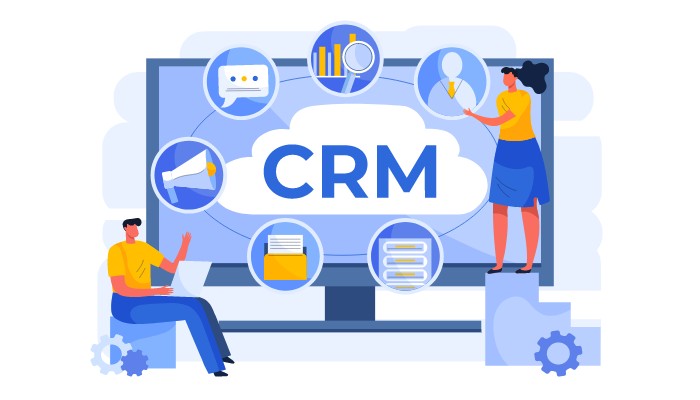CRM is software for sales companies that allows you to automate interaction with customers and manage internal business processes.
The main functions of CRM systems are the collection, storage and use of information about customers (buyers), suppliers and partners.
The "CRM" software product is suitable for small, medium and large businesses, regardless of the type of its activity.
The solution will automate the processes of procurement, sales, marketing and service maintenance.
The market for CRM products includes more than 100 systems.
Most of them completely close the main functionality for work: customer base, event log and current transactions.
Often medium and large businesses are a set of plans, strategies and goals, so it is important that the system meets all the stated requirements of the company.
5 benefits of using CRM
-
1. Reduces costs (expenses)
When you run a business, you are constantly looking for ways to cut your costs. CRM helps reduce the cost of your business because it helps your team focus on more important tasks. CRM systems can manage and analyze customer data. Instead of a team member sifting through all the data trying to make sense of it, a CRM system can do this automatically. This saves time and money.
-
2. Creates more effective advertising campaigns
Attracting potential customers occurs in various ways. But whether it's social media or email, each member of your audience has a different experience with your business. It is important to understand their experience in order to create the best campaign for them.
-
3. Increases engagement
When you create custom plans, you increase engagement. Your audience gets a personalized experience with your business. It's an experience that draws them in and makes them interact with your business. An increase in engagement leads to an increase in sales.
-
4. Creates consistency
When you launch a digital marketing campaign, it is imperative that you remain consistent across all platforms. With CRM, you will understand which messages are best for different audiences. If you're hosting an event, you can send different messages to different groups of your audience. You will create consistency in your campaign, which will lead to higher engagement with your brand.
-
5. Strengthens relationships
Once you earn conversions, it's not the end of the campaign. Your customers don't have to be one-time buyers. It is important that you put the time and effort into building relationships with your customers to keep them coming back.
If a loyal customer has questions or problems with your products or services, they want immediate help. With a CRM system, they will get it.
7 Key Functions of CRM Systems
- The presence of a customer card (often in a pop-up window)
- The entire customer base can be segmented without the risk of data loss
- Employee performance indicators are presented on one screen
- Automated sales funnel
- Task tracker
- Quick creation of standard documents
- Dashboard with indicators, convenient reports with graphs, charts, tables for sales management (dashboard)
Key users of the CRM system
CRM for the administrator (CEO):
- Allows you to see indicators for marketing and finance.
- A convenient form of consolidated reporting will facilitate the adoption of managerial decisions.
- Allows you to optimize sales and marketing campaigns.
- Gives the possibility of effective distribution of tasks between employees.
CRM for marketer:
- Provides a single working tool for the analysis of advertising campaigns.
- Allows you to see the entire history of interactions with the client.
- Increase advertising efficiency and ROI by analyzing sources using ROI.
CRM for manager:
- Provides an opportunity to effectively build relationships with the client.
- With the help of CRM, sales will increase.
- Incoming and outgoing events will be processed in time.
- Work in a single window will allow faster processing of leads and deals.
What business problems does CRM solve?
- Sales growth
- Increasing profitability
- Cost reduction
- Reduction of possible risks
Company services that most often use CRM:
- Sales managers
- Sellers at retail outlets
- Call center operators
- Masters in production
- Administrators, etc.
Automation of activities with the help of the CRM system will allow you to accurately adjust the processes of divisions and departments. The circulation of documents, the assignment of tasks and control over the implementation will eliminate possible errors.
Typical tasks that a company solves after implementing CRM:
- Storing information about the client and their contact details.
- Automatic mailings to the client base.
- Control over the transaction.
- Centralized management of orders to suppliers.
- Creation of the document "Commercial offer".
- Performing discipline, compliance with the deadlines for completing tasks.
- Regulation of the sales process and work with LEADs.
- Analysis of lost profits.
Why managers are not in a hurry to implement a CRM system?
- Often the owners of the company do not understand what benefits a CRM system will create for their business.
- Many owners and managers are afraid that the program will become another waste of money and time.
- Implementing new business processes takes time. In addition, the active involvement of each employee is required, which significantly reduces productivity in core activities. Getting used to the new system, managers may not have time to do the main things.
- Often the introduction of new rules of work in the organization causes resistance.
- A large selection of software products on the market can also scare away. It is important to choose the right system so that it meets all the requirements, and not overpay for extra functionality.
- Vendor or Contractor plays a big role in implementation. Not all CRM system providers have the appropriate competencies and experience.
- Financial issue. Not always the company's budget allows you to spend money on the purchase of licenses and implementation services.
